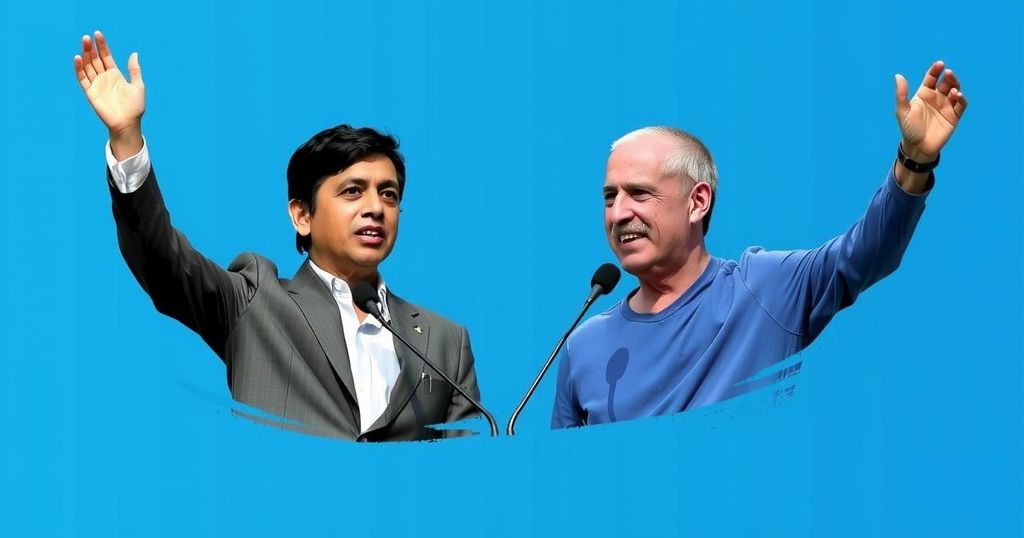Uruguay held a presidential election characterized by high voter turnout and moderate candidates amidst ongoing discussions about social security reform. The electoral process reflects the nation’s political stability relative to neighboring countries, with broad agreement among candidates on key issues, positioning Uruguay as a bastion of democracy in South America.
MONTEVIDEO, Uruguay — On Sunday, Uruguay witnessed a remarkable electoral event as voters selected their new president amidst a backdrop of political stability characterized by two moderate candidates. This election stands in stark contrast to the often tumultuous political landscapes seen in other South American nations, which grapple with divisive tensions and deteriorating democratic values. The electoral process involved approximately 2.7 million eligible voters who not only participated in the presidential election but also voted for parliamentary representatives and a significant referendum regarding an overhaul of the social security system. Following the closure of the polls, local media reported an impressive turnout exceeding 88 percent, indicative of Uruguay’s commitment to its electoral processes, where voting remains mandatory. While the presidential candidates, hailing from the incumbent conservative coalition and a center-left alliance, share broad agreement on several policies, observers do not anticipate a profound transformation in governance. Uruguay, home to 3.4 million residents, is often regarded as a model democracy, renowned for its stability. Political analyst Juan Cruz Díaz of the consultancy group Cefeidas expressed, “In a way, Uruguay has been boring, but boring in this sense is very good.” Uruguay’s political climate remains largely favorable, with a populace that appreciates the current administration’s business-oriented approach and economic performance. The incumbent President Luis Lacalle Pou maintains a positive approval rating of 50%. The election day atmosphere was festive, with supporters from various political factions gathering along Montevideo’s iconic Rambla to celebrate their democratic engagement. Álvaro Delgado, the ruling party’s candidate and former chief of staff to Lacalle Pou, shared his sentiments of pride in the democratic process on social media after casting his vote. His opponent, Yamandú Orsi, a former mayor and history educator from the Frente Amplio coalition, expressed gratitude for the enduring democratic ethos in Uruguay, stating, “Uruguay has had the happiness for 40 uninterrupted years … that our citizens can elect their leaders.” Polls indicate that Orsi leads with 44 percent of voter support, though he may require a run-off election set for November 24, should he not achieve an outright victory. The election also featured Andrés Ojeda, a less conventional candidate who engaged younger voters through innovative campaigning methods. The primary issues during the campaign included the rising crime rates and strategies for poverty alleviation, particularly concerning the significant child poverty rate in Uruguay. The referendum concerning the social security system reform, however, garnered considerable attention, positing a substantial change that could redistribute resources within a country renowned for its robust social policies. Uruguayan citizens approached the ballot with diverse perspectives, with some advocating for the referendum’s passage to enhance retirement security despite concerns about its fiscal ramifications. As Montevideo analyst Julián Kanarek noted, the election had not resonated as expected with the electorate, indicative of a disconnect from traditional civic engagement. Overall, this election underscores Uruguay’s unique political environment, where moderation and consensus stand out as key features amid a broader regional trend toward polarization and unrest.
Uruguay’s political reputation is largely defined by its consistent stability and commitment to democracy, distinguishing it from its neighbors in Latin America, where rising tensions often lead to polarized electoral contests. This election follows a history of progressive legislation, including significant social reforms, and highlights the challenges and public discourse surrounding social security restructuring amidst ongoing discussions about economic equality and public services. It is within this context of political maturity that the latest elections are taking place, with citizens actively engaging in local and national governance through compulsory voting.
In summary, the recent elections in Uruguay exemplify a healthy democratic process characterized by high voter turnout and moderate candidates. The political landscape remains stable, offering a stark contrast to the unrest seen in other Latin American countries. The focus on essential issues such as social security reform indicates a populace engaged with pressing matters that affect their lives, while the commitment to democratic values endures as a point of national pride.
Original Source: www.pbs.org






